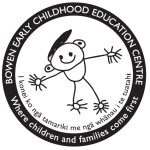To tatou Bowen Whāriki
Te Whāriki is an unique bicultural framework which reflects the early learning context, contemporary theories and the diversity of our New Zealand’s society. Te Whāriki has a vision that all tamariki in New Zealand grow as competent and confident learners who are strong in their identity, language and culture. It encourages all tamariki to learn in their own way, while being supported by adults who know them well and have their best interest at heart. (Te Whāriki, 2017).
The underpinning concept of the whāriki (mat) enables and supports diversity (Te Whāriki, 2017) and as each early childhood setting is unique, the curriculum has guided us in creating ‘To tatou Bowen Whāriki’; our own Bowen curriculum. Using the principles and strands of Te Whāriki, we have created a booklet ‘The learning we value at Bowen Early Childhood Education Centre’ which is available onsite for all parents to view. This booklet describes what the principles and strands of Te Whāriki mean in our learning context and community.
Bowen’s learning priorities
Thinking Magically
Tamariki develop the skills and confidence to express themselves openly and creatively, imaging alternatives to support problem solving and thinking magically about their world.(Te Whāriki – Exploration, Communication, Holistic development)
Agency
Tamariki develop an awareness of their power and potential to make choices, lead their own learning, and make a difference. Through holistic nourishment, tamariki develop a strong sense of self worth and agency.
(Te Whāriki, Well-being, Communication, Empowerment)
Passion
Tamariki develop a strong curiosity for the world around them, fostering a desire to attempt and complete tasks, despite challenges or obstacles, and growing a passion for life-long learning.
(Te Whāriki, Exploration, Contribution, Empowerment, Holistic development)
Whakawhānaungatanga
Tamariki develop a strong sense of connection as a community of learners, through strong, trusting, reciprocal relationships based on aroha, respect and manaakitanga. Tamariki will grow an understanding of their whakapapa, whanau and community and how these things contribute to their sense of identity and working theories of their world.
(Te Whāriki – Contribution, Belonging, Relationships, Family and community).
Ngā Uara Whakapū
Ngā Uara Whakapū translates to the principles and values which underpin our practices at Bowen. There are ten principles and values, five of which sit at the core of what we do. Below outlines what Ngā Uara Whakapū are and what they mean to and for the kaiako, tamariki and whānau here at Bowen. The first five are our core values.
![]() Whānaungatanga- Our relationships are founded on manaakitanga, where we work collaboratively and collectively.
Whānaungatanga- Our relationships are founded on manaakitanga, where we work collaboratively and collectively.
![]()
Manaakitanga – We give others a sense of self-worth, treating them with respect, being generous with our time and showing care.
![]() Aroha –We show love, understanding and compassion to each other.
Aroha –We show love, understanding and compassion to each other.
![]() Kotahitanga – We unite together each with our own unique contributions, while recognising that children need a variety of experiences to support their holistic learning and development.
Kotahitanga – We unite together each with our own unique contributions, while recognising that children need a variety of experiences to support their holistic learning and development.
![]() Ūkaipōtanga – All belong and contribute to the place where they are nurtured, grow and develop
Ūkaipōtanga – All belong and contribute to the place where they are nurtured, grow and develop
Wairuatanga: We are spiritually connected to place and in these places we feel a sense of safety, peace and nourishment or encouragement.
Kaitiakitanga: We look after the place in which we participate and learn in. This includes our materials and our natural world.
Taonga Tuku Iho: Inside us we each have a taonga (treasure) and this treasure has been inherited through our whakapapa. We celebrate our gifts/talents by sharing them with others.
Taha Tinana: We care for our own bodies by eating healthy kai, drinking, moving, resting and sleeping. To keep our bodies well, we keep our place safe and clean.
Rangatiratanga: When we use our own abilities, knowledge and wisdom for the good of others, we lead by example. We do what we said we would do and take responsibility for the wellbeing of others. * Rangatiratanga provides the platform for Tuakana-teina / ako relationships.

